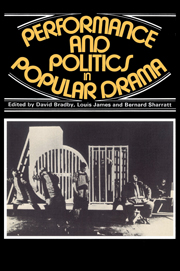 Performance and Politics in Popular Drama
Performance and Politics in Popular Drama Book contents
- Frontmatter
- Contents
- List of contributors
- Preface
- Acknowledgements
- PART ONE Spectacle, performance and audience in nineteenth-century theatre
- PART TWO Politics and performance in twentieth-century drama and film
- PART THREE Problems and prospects
- Introduction
- The politics of the popular? – from melodrama to television
- After Fanshen: a discussion, with the Joint Stock Theatre Company, David Hare, Trevor Griffiths and Steve Gooch
- Appendix: Tempo, Tempo
- Select bibliography
- General index
- Index of titles of plays, films, sketches
- Index of theatres, theatre companies and groups
Introduction
Published online by Cambridge University Press: 08 March 2010
- Frontmatter
- Contents
- List of contributors
- Preface
- Acknowledgements
- PART ONE Spectacle, performance and audience in nineteenth-century theatre
- PART TWO Politics and performance in twentieth-century drama and film
- PART THREE Problems and prospects
- Introduction
- The politics of the popular? – from melodrama to television
- After Fanshen: a discussion, with the Joint Stock Theatre Company, David Hare, Trevor Griffiths and Steve Gooch
- Appendix: Tempo, Tempo
- Select bibliography
- General index
- Index of titles of plays, films, sketches
- Index of theatres, theatre companies and groups
Summary
This final section of the book comprises two contributions to the Kent conference of a rather different kind from the other papers: an edited transcript of part of the discussion, and my own paper, which was an attempt to survey the broad field covered by the conference as a whole and to offer an overview by suggesting some hypotheses about the continuing functions of ‘popular’ forms of art and entertainment in the nineteenth century and the present. The paper was designed, deliberately, as an attempt by a non-specialist to look afresh at a region of academic research and debate in which familiar lines of inquiry have long been established; its argument has been left in a relatively tentative and incomplete form because something of the pressure of thinking, of reflecting upon a wide range of disparate contributions, is worth retaining, and even insisting on, in a debate that is bound to remain problematic. The conjunction of this mainly theoretical paper with a discussion among theatre practitioners is indicative of some of the aims of the conference: to widen the debate about ‘popular theatre’ and to bring together academics and practitioners. Discussion between those participants who worked mainly in education and those who worked professionally in theatre was one central element in the experience of the conference, but writing papers for publication in books of this kind tends to be the preserve of the former. We have therefore included an extract from one of those discussions as a way of reminding readers of the otherwise absent participants. Both the context and the content of the extract are worth commenting on here because they serve to focus some more general considerations.
- Type
- Chapter
- Information
- Performance and Politics in Popular DramaAspects of Popular Entertainment in Theatre, Film and Television, 1800–1976, pp. 271 - 274Publisher: Cambridge University PressPrint publication year: 1980
